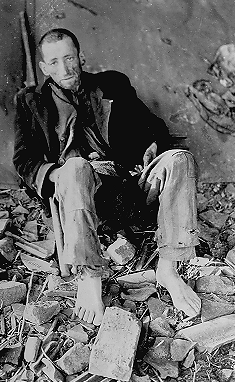Crime and Punishment: The Trial of Eichmann
April 30, 1997
Crime and Punishment: The Trial of Eichmann
By WALTER GOODMAN
The defendant is not the true subject of "The Trial of Adolf Eichmann." Fascinating though he may be as a case study of obsession or bureaucracy or what Hannah Arendt called "the banality of evil," his significance fades beside the enormity of the Holocaust.
As survivors of the Nazi death camps relive their excruciating memories of parents and children lost to machine-gun squads and gas chambers, Eichmann becomes a paltry killer by remote control, just another excrescence of a barbaric ideology.
"What is there to admit?" Nazi Germany's foremost specialist in the treatment of Jews is seen asking at the start of Wednesday night's documentary. "I carried out my orders."
The program tells of his flight to Argentina after World War II and his kidnapping by Israel in 1960, but the power of these two hours comes from the testimony of people from all over Nazi-occupied Europe who were victims of Eichmann's efficient roundup and transport of Jews to so-called labor camps.
In this grippingly edited look at the world's first televised trial, newsreels of the doomed being herded to their deaths document Eichmann's logistical achievement. One witness tries haltingly to explain the fear and despair that kept people from resisting, but there are also reminders of the courageous uprising in the Warsaw Ghetto.
The camera moves from the witness box to the rapt audience, mostly Israelis who find it hard to listen to the unsparing details of their families' fates but are unable to turn away; occasionally there is an outburst from someone who can't bear any more.
A prosecutor seen breaking off his examination of a man who has just told of his last glimpse of his young daughter -- a dot of red in a mass of women and children marked for extermination -- explains to an interviewer that he was silenced by thoughts of what it would be like to watch his own daughter vanish.
Interviews with two of the prosecutors confirm that their purpose from the beginning was not only to get Eichmann, satisfying though that was. Israel was determined to make the Holocaust vivid to Israelis and to the world through the accounts of those who were there. The trial was their legacy.
And there is the defendant in the glass cage. He shows no reaction to the horrors he is hearing. Head tilted, lips tight and twisted, mouth moving as though he were tasting something unpleasant, eyes darting, he is like a silent-movie actor playing a villain. It takes some effort to imagine the man, as one witness describes him, in an SS uniform, hand on pistol, barking orders.
 When, in the climactic days of the trial, Eichmann takes
the stand, he is a grim joke. He says he sought
"peaceful solutions acceptable to both parties."
When, in the climactic days of the trial, Eichmann takes
the stand, he is a grim joke. He says he sought
"peaceful solutions acceptable to both parties."
He compares himself to Pontius Pilate, whether by way of self-criticism or self-admiration it is hard to tell. He compliments himself on having hired a rabbi to teach him Hebrew instead of just forcing the rabbi to do it. He says he was upset by the sight of blood: "I was not the right man for these things." Finally the prosecutor tells him, "If you want to be a laughingstock, do so."
Eichmann's single-string defense was that he was "on the lowest rung," that his "position was too insignificant." He declares repeatedly, "I had to obey." David Brinkley, narrating, dryly sums up his case: "He was just following orders." An Israeli comments, "Humanity does not know how to punish people like this."
Wednesday night's painful yet necessary recapitulation ends with an Auschwitz survivor who watched as Eichmann's incinerated remains were thrown into the sea. Reflecting on the handful of ash left from a single human body, he recalls the abundant ashes from the camp ovens, enough to spread over the icy paths so that the guards would not slip while on patrol.
9 p.m. ET Wednesday (April 30, 1997) on PBS
Pete Simmons and Lisa Zeff, executive producers; Daniel Polin and Kenneth Mandel, producers; Stan Warnow and Benno Schoberth, editors; photography by Yoram Millo; sound by Uri Buzaglo and Meir Alfasi. A production of Great Projects Film Co. and ABC News Productions. David Brinkley, anchor.
With the voices of: Eric Bogosian, Bruce Davison, Melissa Gilbert, Judd Hirsch, Anne Jackson, Alan King, Stephen Lang, Matthew Modine, Sam Robards, Tony Roberts, Ron Silver, Mary Steenburgen and Eli Wallach.
Copyright 1997 The New York Times Company
|
HOLOCAUST HOME | FILREIS HOME | NEWS |
|
| http://writing.upenn.edu/~afilreis/Holocaust/eichmann-tv.html - - - Last modified: Friday, 06-Aug-2004 09:19:16 EDT | |